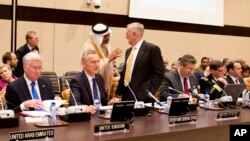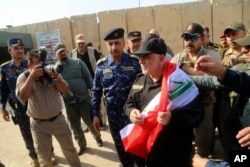From stemming the flow of foreign fighters to cracking down on terrorism financing, global coalition leaders are meeting in Washington this week to explore ways to further intensify pressure on the Islamic State militant group.
The State Department is hosting the gathering that begins a day after the Iraqi government formally declared the liberation of Mosul from IS militants.
U.S. officials say the 72-member anti-IS coalition on Wednesday will examine how to accelerate global efforts to defeat IS in the remaining areas the group holds in Iraq and Syria, while maximizing pressure globally on its branches, affiliates, and networks.
“The meetings come at a key moment in the fight against ISIS just as Mosul has been liberated,” said State Department spokesperson Heather Nauert on Tuesday.
“The coalition's working groups on stabilization support, counter finance, foreign terror fighters and counter messaging are convening to evaluate the progress and also discuss how to build upon momentum that are achieved in each of those areas,” added Nauert.
Focus on stabilization efforts
On Thursday, about 30 members of “the key Coalition stakeholders” will convene to discuss priorities to set IS on “an irreversible and lasting path to defeat,” building on the progress in Mosul and Raqqa. The group will also focus on stabilization efforts in Iraq to facilitate the voluntary return home of those who have been displaced by the violence, according the State Department
Representatives from a number of African countries are also invited to the small group meeting on Thursday.
Secretary of State Rex Tillerson spoke with Somalia President Mohamed Abdullahi Farmaajo on Thursday, according to the State Department.
The government of Somalia, a member of the 72-member Global Coalition to Defeat ISIS, said Washington reaffirmed its commitment to “support Somalia and cooperate on eradicating the threats of terror.”
Additional funding for Iraq
The United States announced last week it will provide an additional $150 million to help stabilize Iraq after Islamic State militants are driven out.
The U.S. Agency for International Development (USAID) will work through the U.N. Development Program.
“The funds will support efforts to establish basic security, re-establish essential services, restore local economies, stabilize communities and allow Iraqis to finally return home,” said State Department spokesperson Heather Nauert.
The U.S. funding, part of a total U.S. commitment of more than $265 million over two years, will also provide temporary, cash-for-work employment to jump-start local economies, officials said.
The last coalition meeting at the foreign ministers’ level was hosted by Tillerson at the State Department in March.





